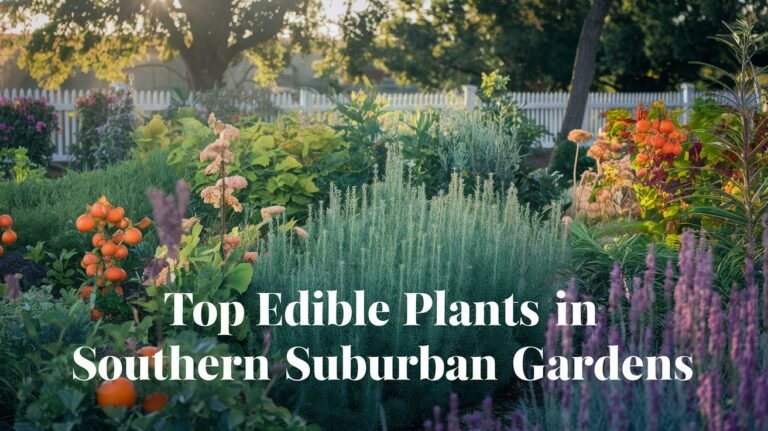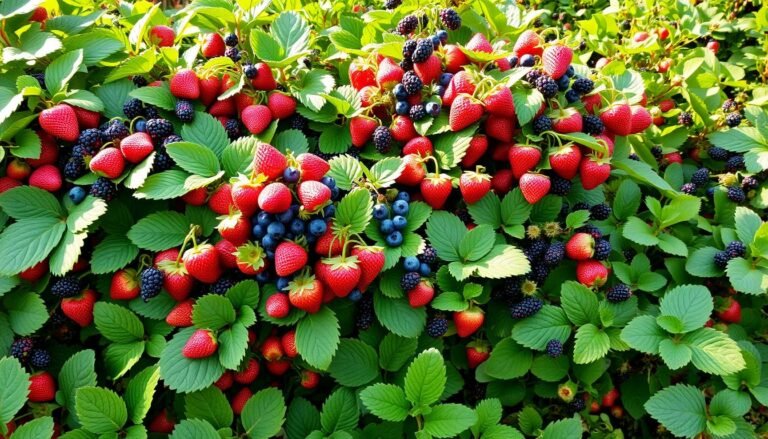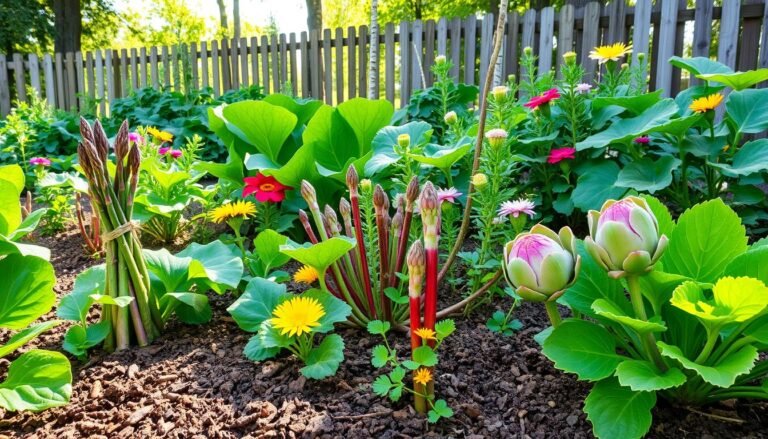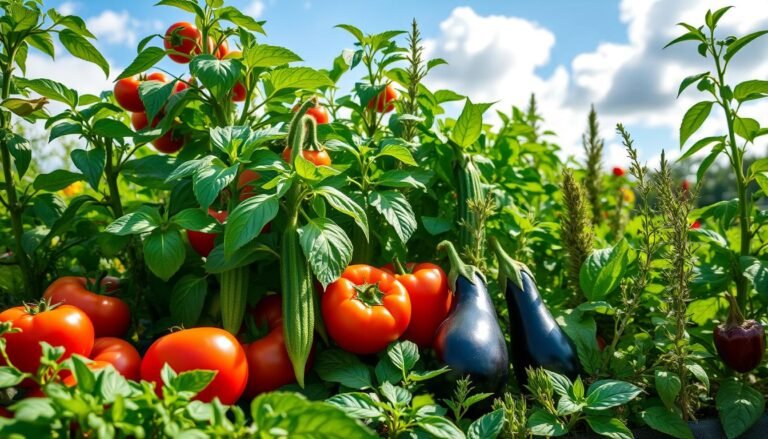Maximize Beauty and Bounty: Innovative Suburban Gardening in Zone 9
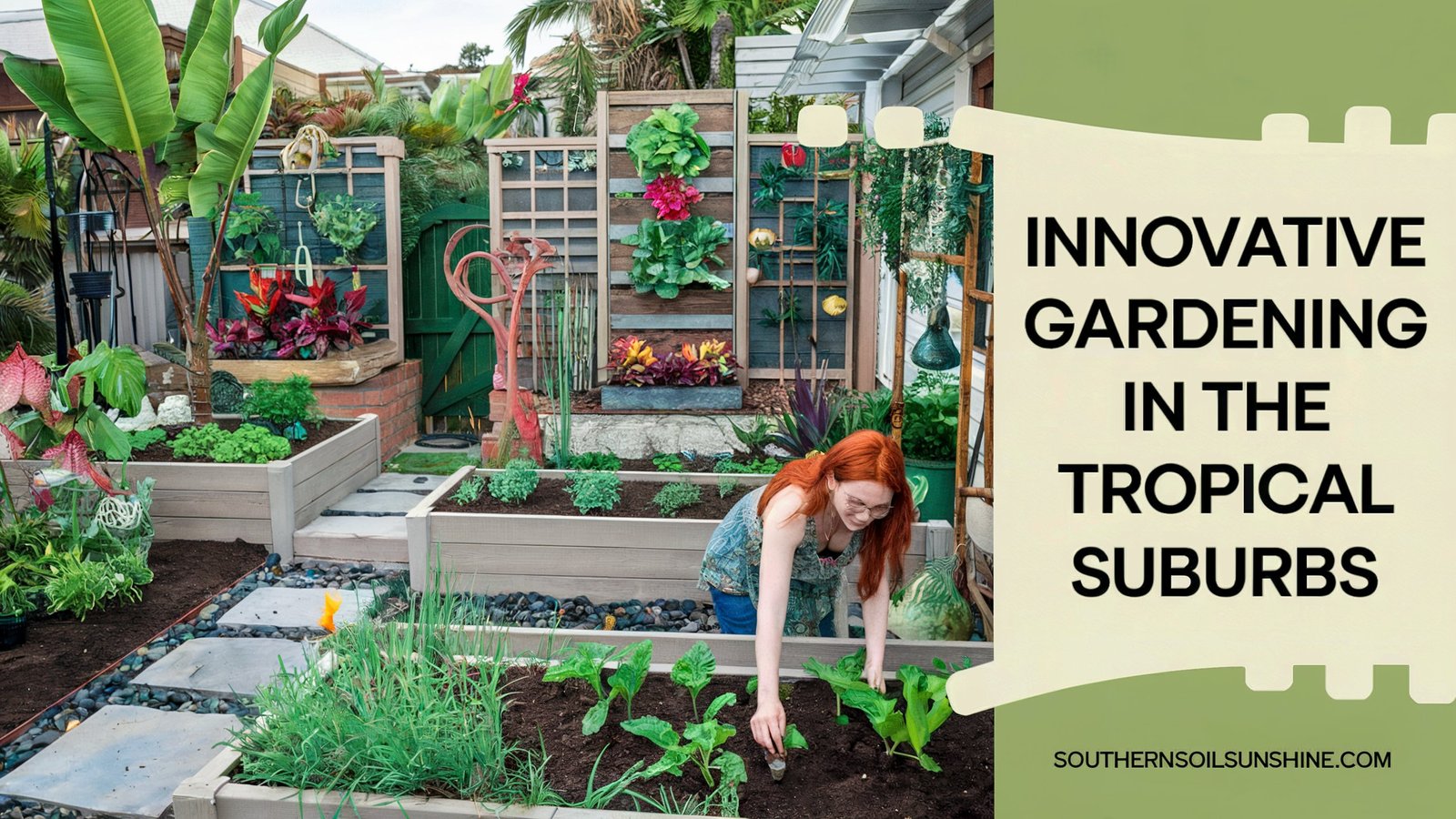
Some of the links on this website are affiliate links, which means that if you make a purchase through these links, I may earn a small commission at no additional cost to you. As an Amazon Associate, I earn from qualifying purchases. I only recommend products I genuinely trust and believe will bring value to my readers. Also, some of the content was created with strategic use of AI tools. For more information, please visit the Privacy Policy page. Thank you for supporting my blog and helping me continue to provide valuable content.
The Fusion of Aesthetics and Functionality in Innovative Suburban Gardening
When I think of innovative suburban gardening in a tropical suburb like southern Texas, the first thing that comes to mind is the vital blend of beauty and functionality. In suburban areas where space might be limited, it’s crucial to design gardens that are as pleasing to the eye as they are productive. By creatively integrating decorative landscaping with practical gardening techniques, even small spaces can flourish and transform into lush, vibrant environments. This approach not only maximizes the available space but also enriches our lives by bringing nature closer to home. Whether through the use of vertical gardens, strategic plant placement, or seasonal planting, innovative suburban gardening allows us to enjoy a year-round bounty while relishing in the garden’s ever-evolving beauty. Throughout this blog, we’ll explore diverse strategies and ideas that can help you make the most of your garden—enhancing both its aesthetic appeal and its functional value. Let’s delve into these delightful approaches and discover how you can transform your garden into a thriving oasis, right in your own backyard.
7 Innovative Ways to Maximize the Beauty and Bounty of Your Tropical Suburban Garden
1. Optimize Garden Space through Innovative Practices

Utilize raised beds and vertical gardens to maximize your garden area. Raised beds offer a neat, structured appearance and make maintenance easier, while vertical gardens save space by allowing plants to grow upwards. Raised beds bring a neat, structured look, and they’re easier to tend without all that bending down. Vertical gardens, especially with trailing herbs or small vegetables like beautiful peas in the spring, add a dynamic, eye-catching element that also maximizes space.
2. Innovative Layouts for Suburban Gardens
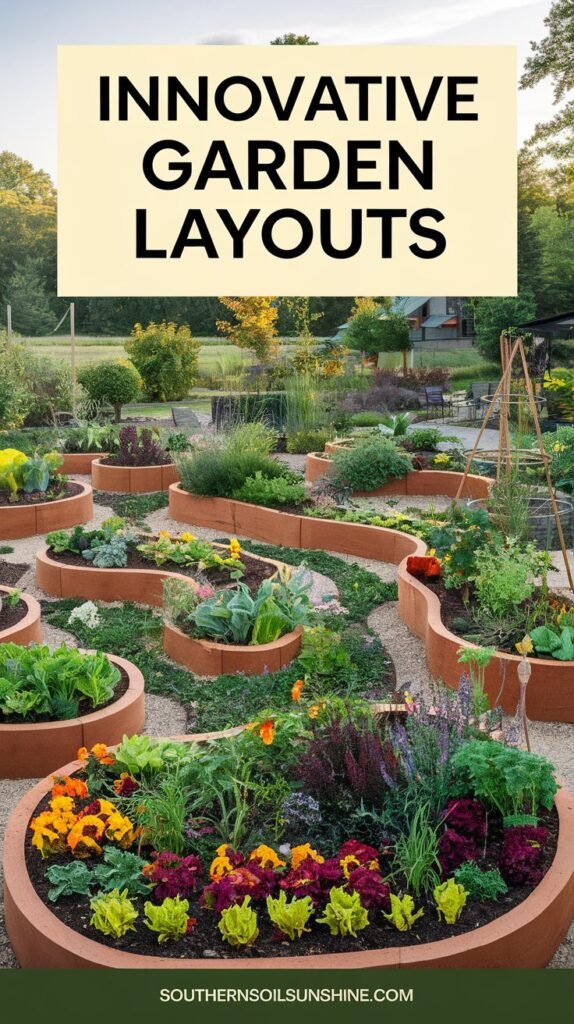
Don’t limit yourself to rigid shapes when planning your garden. Incorporate existing structures like flower beds by adding edibles to them for a practical and aesthetic expansion. Creativity is key. A raised bed can be very small, or larger, tucked in a corner of a yard, or landscaped around a fence. Start small, look at an area that is directly in your line of sight when you look outside. What small area could you begin with? what shape could it take? What kinds of plants, colors, patterns bring you joy? The possibilities are endless, but not allowing yourself to get overwhelmed is essential.
3. Plant Selection for Vertical Gardens in Suburban Spaces

Use trailing herbs and small vegetables like indeterminate tomatoes, cucumbers, peas, and beans that can be trained up poles or fences, turning these structures into eye-catching elements. When planning a vertical garden, choose climbing and trailing plants that naturally thrive when they grow upwards. Indeterminate tomatoes, cucumbers, peas, and beans are ideal choices, as they can be trained to climb up poles, trellises, or fences, transforming these structures into both functional and visually appealing elements. Ensuring that these plants receive adequate sunlight and air circulation is essential, as their elevation exposes them to more environmental factors.
Implement sturdy support systems like trellises to promote healthy growth and prevent soil contact, reducing disease risk. Additionally, consider incorporating trailing herbs such as rosemary or thyme, as they add both culinary value and beauty to the garden. Regular maintenance, including pruning and guiding plants, is crucial to optimize their upward growth, making harvesting easier and keeping the garden organized. By selecting the right plants and supporting their vertical spread, you can maximize space and enhance the aesthetic appeal of your garden.
4. Creating Functional Walkways in Your Suburban Gardening

Add stone pathways or mulch-covered trails around your beds to allow easy access for maintenance and harvesting, enhancing the garden’s charm and functionality. Creating functional walkways in your garden not only enhances its aesthetic appeal but also significantly improves access and maintenance. Incorporating stone pathways or mulch-covered trails around your garden beds allows for easy navigation, making it simpler to water, prune, and harvest. These pathways prevent soil compaction directly around your plants by directing foot traffic, which is essential for maintaining healthy root systems.
Additionally, the materials chosen for these walkways, such as natural stones or mulch, can complement the garden’s design, adding a rustic or polished look according to your preference. Beyond their practical benefits, well-placed walkways invite exploration and create a structured feel, helping to define spaces within your garden. Moreover, they can serve as borders to separate different sections, keeping specific areas designated for flowers, vegetables, or herbs tidy and organized. By planning your walkways carefully, you ensure that every part of your garden remains accessible and visually pleasing throughout the year.
5. Strategic Plant Placement for Innovative Suburban Gardening

Position plants to optimize sunlight and airflow by grouping those with similar water and sunlight needs. This helps streamline care routines and prevent overwatering or underexposure. Strategically placing plants in your garden is crucial for optimizing sunlight and airflow, which can significantly impact the health and productivity of your garden. When planning your garden layout, group plants with similar water and sunlight needs to streamline care and minimize the risk of overwatering or inadequate sunlight exposure. For instance, sun-loving plants such as tomatoes, peppers, and eggplants thrive in full sun conditions, so they should be positioned in areas that receive at least 6-8 hours of direct sunlight per day.
Conversely, leafy greens like lettuce, spinach, and Swiss chard, which prefer partial shade, can be situated in spots that receive less intense light, especially in the afternoon. Additionally, consider placing taller plants like corn or sunflowers towards the north or west of your garden to prevent them from casting shade on shorter plants. By carefully considering the specific needs of each plant and planning their placement accordingly, you ensure that your garden remains healthy, vibrant, and easy to manage throughout the growing season.
6. Seasonal Planting Tips for Innovative Suburban Gardens
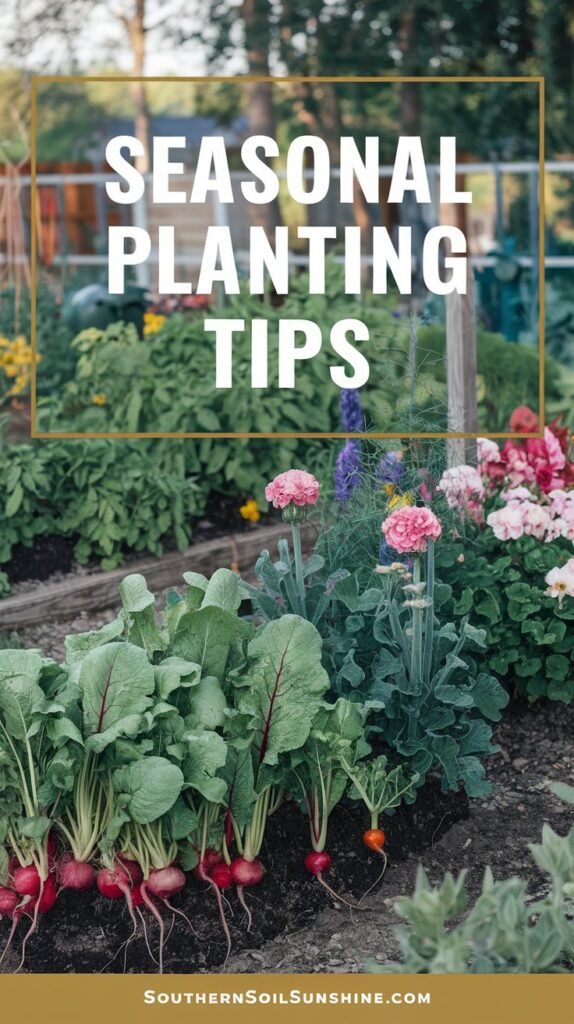
Seasonal planting is an essential strategy for maximizing productivity and variety in a Zone 9 garden, where the climate allows for nearly year-round growing. By rotating crops and planting in succession, you can ensure your garden remains vibrant with diverse foliage and produce throughout different seasons. For spring, start with cool-season crops such as lettuce, carrots, and radishes, which thrive in the milder temperatures. As summer approaches, transition to warm-season plants like tomatoes, peppers, and cucumbers, which flourish in the hotter climate.
In the fall, consider planting quick-maturing crops like spinach and kale, which grow well as temperatures begin to cool down. This continual cycle of planting and harvesting minimizes downtime and maintains soil health by reducing pest buildup and nutrient depletion. Additionally, incorporating a mix of perennials that bloom in different seasons keeps your garden visually appealing year-round, providing both decorative flowers and persistent greenery. By planning and adjusting your plantings with the seasons, your garden can provide a constant supply of fresh produce and a dynamic landscape that evolves with the year.
7. Add Garden Ornaments to Enhance Suburban Gardening Spaces
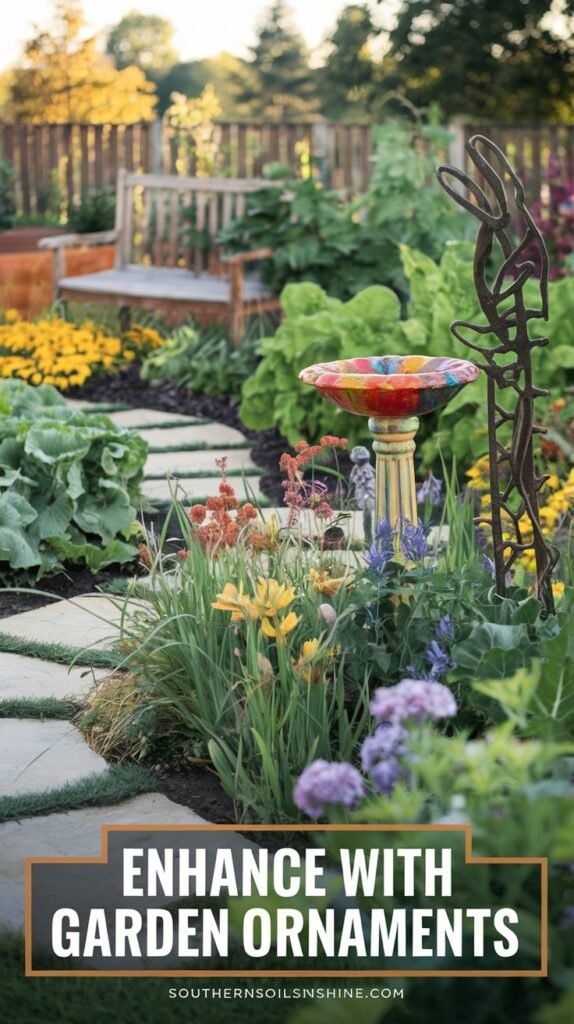
Incorporating garden ornaments is a wonderful way to add personality and visual interest to your garden space. These decorative elements can range from rustic metal sculptures and colorful ceramic tiles to whimsical wind chimes and elegant birdbaths. Not only do these ornaments enhance the garden’s aesthetic appeal by adding focal points and artistic features, but they also create an inviting atmosphere that reflects your personal style. For example, a well-placed birdbath can attract more wildlife, bringing additional life and movement to your garden. Sculptures can serve as striking centerpieces amid beds of flowers or vegetables, providing year-round beauty. Wind chimes offer a playful, musical element that changes with the breeze, adding an auditory dimension to your garden’s ambiance. When selecting ornaments, consider the overall theme and layout of your garden to ensure they complement and enhance the existing elements without overcrowding the space. By thoughtfully choosing and placing garden ornaments, you can transform your garden into a vibrant, personalized retreat that delights the senses and adds charm to your outdoor environment.
Essential Resources for Successful Suburban Gardening
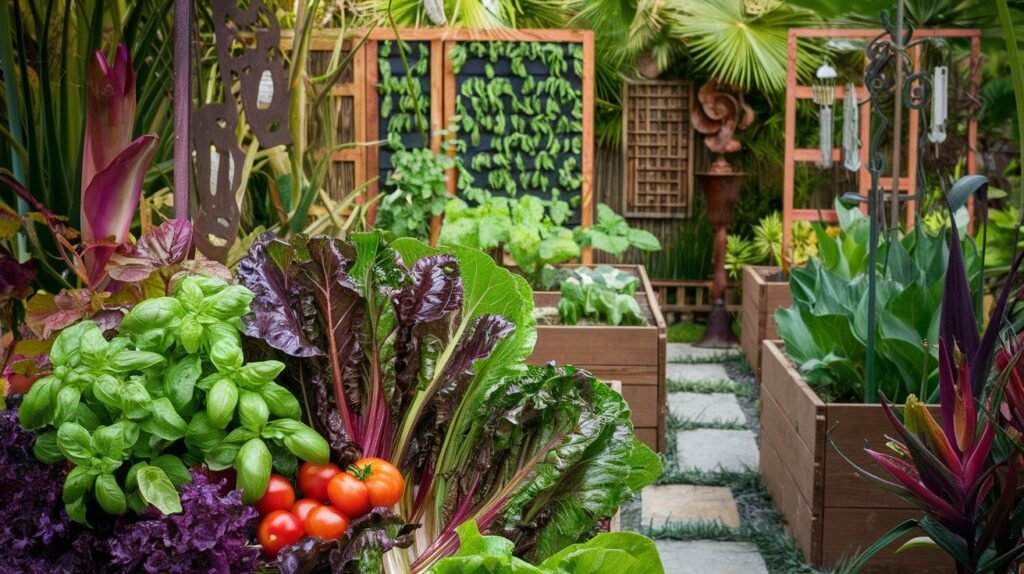
Let me share my passion for tropical gardening! I’ve spent years cultivating my own slice of paradise, and I’ve learned so much along the way. Here’s what I’ve discovered about successful tropical gardening:
🌱 Essential Resources I Use:
- Seeds: I absolutely love Baker Creek Heirloom Seeds! Their Thai basil and Caribbean peppers have transformed my garden.
- Soil & Compost: My secret weapon? I mix my own super-soil! I get organic base soil from Gardener’s Supply Company and blend it with:
- Homemade compost (banana peels work wonders!)
- Coconut coir
- Worm castings
Here’s a quick comparison of my favorite seed suppliers:
| Company | Specialties | My Experience |
|---|---|---|
| Baker Creek | Heirloom varieties | Excellent germination rates! |
| Seed Savers Exchange | Tropical fruits | Great growing guides |
| Southern Exposure | Heat-tolerant veggies | Fast shipping |
Tools That Changed My Game: I can’t believe I gardened for years without a vertical system! When I installed my first GreenStalk tower, I doubled my herb production in half the space. Now I’m growing up, not out!
3 Money-Saving Tips That Work:
- I collect rainwater in recycled barrels – saved $200 on water last year!
- Started composting ALL my kitchen scraps (even coffee grounds!)
- Share seedlings with neighbors and friends – we’ve created an amazing exchange network
Remember, every failed plant teaches us something! I killed three passion fruit vines before finally getting it right. Don’t give up – tropical gardening is an adventure worth taking!
I’m telling you, nothing beats the feeling of harvesting your first homegrown papaya or seeing your dragon fruit cactus finally bloom! It’s pure magic! 🌺
Want to get started? Let me know if you need more specific tips for your growing zone!
Sources:
- University of Florida IFAS Extension: “Tropical Gardening Guidelines” (2023)
- Journal of Sustainable Agriculture: “Vertical Gardening Systems” (Vol 45, 2022)
- My own garden journal data from 2020-2024!







